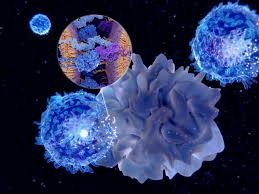COVID-19 News: Canadian Study Finds That SARS-CoV-2 NSP5 Prevents And Delays Viral Clearance By Antagonizing The MHC II Antigen Presentation Pathway!
COVID-19 News - NSP5 - MHC II - HDAC2 Feb 19, 2023 2 years, 2 months, 1 day, 16 hours, 12 minutes ago
COVID-19 News: Researchers from Department of Microbiology and Immunology, and the Western Infection, Immunity and Inflammation Centre, The University of Western Ontario-Canada and the Robarts Research Institute, Ontario-Canada have in a new study found that the SARS-CoV-2 non-structural protein 5 (NSp5) prevents and delays viral clearance in the infected by antagonizing the MHC II antigen presentation pathway via hijacking histone deacetylase 2 (HDAC2).

The viral clearance of SARS-CoV-2 requires a multi-faceted immune response that is initiated by innate immune cells, with infection ultimately resolved by adaptive immune mechanisms.
Importantly induction of adaptive immunity to SARS-CoV-2 is dependent on the presentation of viral antigens on MHC II by professional antigen presenting cells such as dendritic cells and macrophages, to induce robust activation of CD4+ T cells.
However, it was found that SARS-CoV-2 interferes with antigen presentation by downregulating MHC II on the antigen presenting cells of COVID-19 patients, but the molecular mechanism mediating this process is unelucidated.
The detailed analysis of protein and gene expression in human antigen presenting cells in this study reveals that the expression of MHC II is inhibited by the SARS-CoV-2 main protease, NSP5.
It was discovered that suppression of MHC II expression occurs via downregulation of the transcription factor CIITA, which is required for MHC II expression. This downregulation of CIITA is independent of NSP5’s proteolytic activity, and rather, NSP5 delivers HDAC2 to the CIITA promoter via interactions with IRF3, Here, HDAC2 deacetylates and inactivates the CIITA promoter. This loss of CIITA expression prevents further expression of MHC II, with this suppression alleviated by ectopic expression of CIITA or knockdown of HDAC2.
The study findings identify a novel mechanism by which SARS-CoV-2 can limit antigen presentation on MHC II, thereby delaying or weakening the subsequent adaptive immune response.
The study findings were published on a preprint server and is currently being peer reviewed.
https://www.biorxiv.org/content/10.1101/2023.02.10.528032v1
Previous
COVID-19 News coverages have already shown that various other SARS-CoV-2 non-structural proteins also play key roles in evading, disrupting or damaging human host immune responses through a variety of ways.
https://www.thailandmedical.news/news/covid-19-news-university-of-texas-study-shows-that-sars-cov-2-uses-nonstructural-protein-16-to-evade-restriction-by-ifit1-and-ifit3-
https://www.thailandmedical.news/news/covid-19-research-chinese-study-finds-that-sars-cov-2-nsp15-protein-suppresses-type-1-interfero
n-production
https://www.thailandmedical.news/news/covid-19-news-scientists-discover-yet-an-additional-mechanism-by-which-sars-cov-2-disarms-host-immune-responses,-nsp-inhibits-stress-granule-formation
https://www.thailandmedical.news/news/covid-19-news-stanford-study-discovers-sars-cov-2-evades-immune-system-s-nk-cells-via-nsp1-induced-downregulation-of-receptor-nkg2d-ligands
https://www.thailandmedical.news/news/breaking-mutations-on-omicron-non-structural-protein-6-nsp6-alters-viral-disruption-modes-of-autophagy-in-host,-leading-to-possibly-more-serious-long-
https://www.thailandmedical.news/news/breaking-sars-cov-2-research-new-study-by-nih-reveals-that-sars-cov-2-nsp15-s-uridine-cleavage-can-evade-the-immune-response
https://www.thailandmedical.news/news/university-of-texas-study-discovers-that-sars-cov-2-utilizes-metal-dependent-mechanism-to-evade-immune-detection-in-the-human-host-body
https://www.thailandmedical.news/news/breaking-covid-19-genomics-sars-cov-2-has-mechanism-to-mimic-host-cellular-mrnas,-protecting-itself-from-host-innate-immune-restriction-
This current Canadian study demonstrated that SARS-CoV-2 NSP5 suppresses expression of CIITA across a range of professional and non-professional antigen presenting cells, thereby suppressing MHC II expression.
This suppression of CIITA expression occurs via a novel pathway in which NSP5 delivers HDAC2 to the CIITA promoter via interactions between NSP5 and promoter-bound IRF3. HDAC2 then deacetylates histones at the CIITA promoter, decreasing CIITA expression, thereby blocking MHC II expression.
The study team found that SARS-CoV-2 NSP5 selectively inhibited expression of MHC II and CIITA without affecting expression of CD86 and RFX5, or globally suppressing acetylation.
HDAC2 is a promising target for treatment of SARS-CoV-2 infection. Indeed, epigenetic changes consistent with HDAC2 activity drives the cytokine storm that is responsible for much of the pathology seen in SARS-CoV-2 patients, with the degree of epigenetic change correlated to disease severity.
The NSP5 protein is thought to drive much of the cytokine response in the infected lung via HDAC2, and indeed, HDAC2 is required for the upregulation of many pro-inflammatory molecules in endothelial and myeloid cells undergoing SARS-CoV-2 infection.
Many HDAC inhibitors exhibit potent anti-inflammatory effects and therefore may antagonize many of the inflammatory pathways activated by SARS-CoV-2.
Outside of inflammation, HDACs positively regulate ACE2 expression, and consequentially, HDAC2 inhibitors decrease SARS-CoV-2 entry and replication through reduced ACE2 expression.
It has also been known that HDAC inhibitors downregulate pro-inflammatory cytokines, reduce lung fibrosis, prevent viral entry into the central nervous system, and decrease neurological damage.
Hence HDAC2 inhibition may improve patient outcomes through multiple mechanisms in addition to restoration of antigen presentation on MHC II.
Importantly, targeting a host protein would reduce the likelihood of SARS-CoV-2 evolving resistance to this treatment.
Comprehending how SARS-CoV-2 modulates the MHC II antigen presentation pathway provides an important insight into the immune-evasion tactics used by this virus and may help to provide directions for the design of future COVID-19 vaccines or therapeutics.
The study findings reveal one mechanism through which SARS-CoV-2 suppresses adaptive immunity by antagonizing the MHC II antigen presentation pathway.
The study findings also indicate that SARS-CoV-2 may utilize NSP5 to modulate a broad array of immune responses via targeting HDAC2, which in addition to its effects on MHC II expression identified herein, has also been identified as a positive regulator of the cytokine storm that underlies much of the pathology of COVID-19.
For the latest
COVID-19 News, keep on logging to Thailand Medical News.
Read Also:
https://www.thailandmedical.news/news/mutations-covid-19-study-shows-that-often-ignored-mutations-on-nsp4-and-nsp16-regions-of-sars-cov-2-genome-plays-critical-role-in-pathogenesis
https://www.thailandmedical.news/news/breaking-german-study-reveals-that-nsp1-protein-from-sars-cov-2-suppresses-human-host-genes,-long-term-health-implications-expected
https://www.thailandmedical.news/news/french-researchers-uncover-that-sars-cov-2-nsp3-protein-interacts-with-human-host-rna-g-quadruplexes,-contributing-to-virulence
https://www.thailandmedical.news/news/covid-19-news-sars-cov-nsp2-protein-enhances-microrna-mediated-translational-repression-with-serious-long-term-health-implications
https://www.thailandmedical.news/news/great-news-study-shows-that-sars-cov-2-protein-nsp13-is-able-to-cause-dna-damage-and-dysregulate-tumor-suppressor-gene-p53,-increasing-cancer-risk
https://www.thailandmedical.news/news/breaking-hypothesis-that-majority-exposed-to-sars-cov-2-will-have-shortened-lifespans-validated-by-study-showing-nsp2-impairs-human-4ehp-gigyf2-comple
https://www.thailandmedical.news/news/breaking-university-of-maryland-study-shockingly-finds-that-sars-cov-2-nsp6-proteins-can-induce-morphological-and-functional-defects-in-the-heart
https://www.thailandmedical.news/news/breaking-sars-cov-2-ba-2-variant-spawning-mutations-on-its-mpro-sites-that-reduce-efficacy-of-the-antiviral-paxlovid-many-such-variants-in-america-no
https://www.thailandmedical.news/news/breaking-indiana-university-finds-that-transcriptome-of-human-pluripotent-stem-cell-derived-cardiomyocytes-compromised-by-sars-cov-2-nsp6,-nsp8-and-m-
https://www.thailandmedical.news/news/israeli-scientist-identify-nsp2,-nsp5-c145a-and-nsp7-as-key-sars-cov-2-proteins-that-damage-human-host-endothelial-cells-of-blood-vessels
https://www.thailandmedical.news/news/coronavirus-latest-yale-study-shows-that-nonstructural-protein-1-of-sars-cov-2-hijacks-host-protein-synthesis-in-ribosomes-to-make-viral-proteins
https://www.thailandmedical.news/news/breaking-covid-19-research-german-study-reveals-that-spike-protein-nsp1-of-sars-cov-2-responsible-for-shutting-down-host-protein-production
https://www.thailandmedical.news/news/covid-19-genomics-swiss-researchers-discover-how-sars-cov-2-nsp1-protein-inhibits-host-translation--findings-has-implications-for-vaccines-and-drugs
https://www.thailandmedical.news/news/could-study-that-shows-proteins-nsp12-and-13-of-sars-cov-2-causing-mitochondrial-dysfunction-explain-for-prevalence-of-chronic-fatigue-syndrome-in-cov
